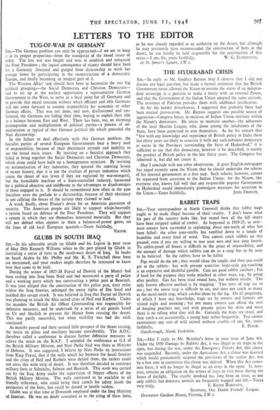GLUBB IN SOUTH IRAQ
SIR,—In his admirable article on Glubb and his Legion in your issue of May 28th Kenneth Williams refers to the part played by Glubb in instituting a series of forts in fhe south-west desert of Iraq. In books on Saudi Arabia by Mr. Philby and Mr. K. S. Twitchell these forts are mentioned, and your readers might therefore be interested to know how they came to be built.
During the winter of 1927-28 Faysal ud Dawish of the Mutair had been raiding into Iraq from Nejd and had massacred a party of police and a working party which was constructing a police post at Basaiyah. It was later alleged that the construction of this police post, sixty miles within the Iraq frontier, infringed the treaty rights of Ibn Saud and justified this savage attack. It was believed in Iraq that Faysal ud Dawish was planning to attack the Shia sacred cities of Nejf and Kerbela. Under the mandate' the British Air Officer Commanding was responsible for defensive measures, and he undertook by a series of air patrols based on Ur and Shaibah to prevent the Mutair from crossing the desert. This was partly successful, but when visibility was bad the raids continued.
As months passed and there seemed little prospect of the threat ceasing, the strain on pilots and machines became considerable. The A.O.C. therefore called a conference to discuss further defensive measures to relieve the strain on the R.A.F. I attended the conference as G.1 of the British Military Mission, and Nuri Pasha Said was there as Minister of Defence. It was suggested, I belieVe by Nuri Pasha on instructions from King Faysal, that if the wells which lay between the Saudi frontier and the cities of Nejf and Kerbela were denied them, the raiders could not cross this wide strip of desert. It was therefore decided to construct military forts at Sabaitcha, Salman and Basaiyah. This work was carried out by the Iraq Army under the supervision of Sapper officers of the British Military Mission. The wells continued to be available to all friendly tribesmen, who could bring their camels for safety inside the perimeters of the forts, but could be denied to hostile raiders.
Glubb was at that time at-Diwanieh employed under the Iraq Ministry interior- He was no doubt consulted as to the siting of these forts, as he was already regarded as an authority on the desert, but although he may previously have recommended the construction of forts in the desert, he can hardly be held responsible for the construction of this






























 Previous page
Previous page